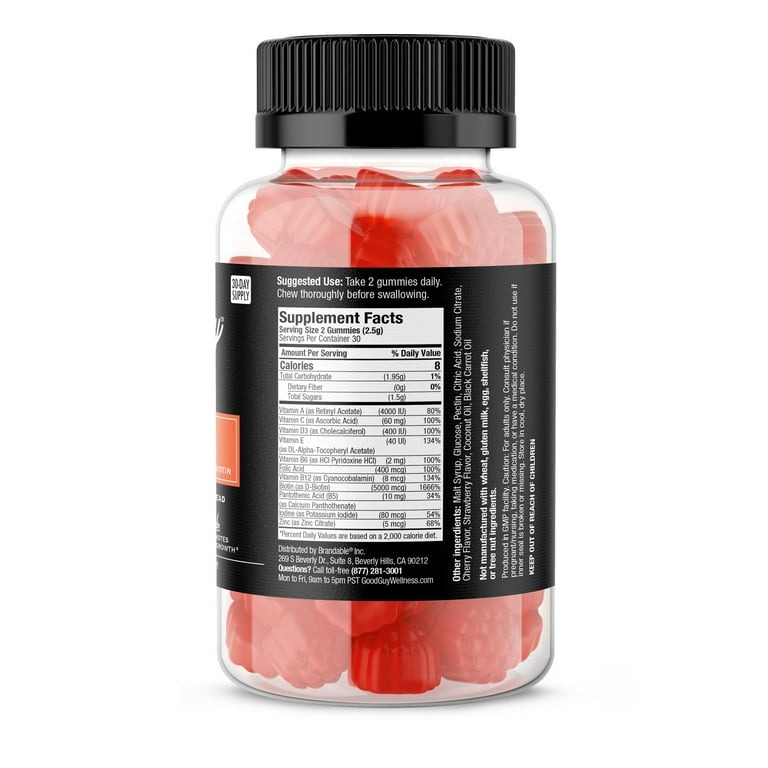
The Connection Between Vitamins and Hair Health
Healthy hair relies heavily on the right vitamins to grow and stay strong. Just like other parts of the body, hair needs various nutrients to be healthy. Vitamins for hair loss play a critical role in creating a strong foundation for hair growth. Hair is made up of a protein called keratin, and certain vitamins help in the synthesis of this protein. A deficiency in key vitamins can lead to hair thinning and loss. Ensuring you get enough of these essential vitamins can help prevent hair loss and promote hair health.
Vitamins do this by nurturing the scalp and hair follicles. They also protect hair from external factors like pollution and sun damage. Additionally, vitamins help to regulate the hair growth cycle. This means they can aid in both preventing hair loss and in stimulating new growth. When you incorporate the right vitamins into your diet, you give your hair the best chance to be strong and healthy.
Key Vitamins That Fight Hair Loss
Hair thrives when it gets the right vitamins. Certain vitamins can battle hair loss effectively. They boost hair from its roots, making your mane healthier. Let’s explore these essential vitamins.
Vitamin A and Hair Growth
Vitamin A helps skin glands make sebum. Sebum moisturizes the scalp and helps keep hair healthy. Too little can lead to dry, itchy scalp and hair loss. But be careful, too much vitamin A can harm your hair.
Vitamin E’s Role in Hair Repair
Vitamin E has antioxidant properties. It fights free radicals that can damage hair follicles. This can lead to stronger, less brittle hair. Apply Vitamin E topically or consume it for best results.
B-Vitamins and Their Impact on Hair Strength
B-vitamins, especially biotin, are key for hair strength. They help hair maintain its fibrous structure. Deficiencies in these vitamins can lead to weaker hair.
Vitamin C: Antioxidant Support for the Scalp
Hair follicles benefit from vitamin C’s antioxidant protection. It combats oxidative stress that can lead to hair loss. Plus, it aids in collagen production and iron absorption.
Vitamin D’s Influence on Hair Follicles
Low levels of vitamin D are linked to alopecia, a form of hair loss. This vitamin helps create new hair follicles. This can help maintain full and vibrant hair.
Foods Rich in Hair-Friendly Vitamins

Eating the right foods is key to getting the vitamins you need for hair health. Here are some vitamin-rich options to add to your meals.
Incorporating Vitamin A into Your Diet
To get enough Vitamin A, eat sweet potatoes, carrots, and kale. These foods are rich in beta-carotene, which turns into Vitamin A in your body.
Best Sources of Vitamin E for Hair Health
Nuts like almonds and seeds such as sunflower seeds are loaded with Vitamin E. Add them to your diet for healthier hair.
B-Vitamin-Rich Foods to Prevent Hair Loss
Lean meats, whole grains, and bananas have lots of B-vitamins. This helps strengthen your hair from within.
Antioxidant-Rich Fruits and Veggies for Vitamin C
Load up on citrus fruits, strawberries, and bell peppers for a Vitamin C boost. This nutrient fights free radicals that can harm your scalp and hair.
How to Get More Vitamin D Through Diet
Fatty fish, like salmon and mackerel, are high in Vitamin D. Also consider fortified foods, such as milk and orange juice, to up your intake.
The Role of Minerals in Preventing Hair Loss
While vitamins for hair loss grab much of the limelight, minerals also play a vital part. Our hair needs a blend of both vitamins and essential minerals to grow healthily. Minerals such as iron and zinc contribute profoundly to the hair’s lifecycle. They offer strength to hair strands, and safeguard hair follicles. Below we delve into how iron and zinc assist in preventing hair loss and how you can get them.
Iron’s Importance for Hair Growth
Iron is crucial for hair growth. It helps red blood cells carry oxygen to your cells. This includes the cells that stimulate hair growth. Lack of iron, or anemia, can lead to hair loss because hair follicles don’t get enough oxygen. Women are especially prone to iron-deficiency anemia. Rich sources include red meat, spinach, and lentils. Adding these to your diet can aid in maintaining healthy hair.
Zinc: An Essential Mineral for Hair Repair
Zinc strengthens hair follicles and aids in hair regrowth. It helps with the oil production around hair follicles which is vital for hair growth. A deficiency in zinc can lead to hair shedding. Poultry, pumpkin seeds, and chickpeas are great for upping your zinc intake. Aim for natural sources before considering supplements to keep your hair robust.
Supplements vs. Natural Sources: What’s Best for Hair Health?

Choosing between supplements and natural sources for vitamins can be tough. Many people wonder which is better for hair health. To make the right choice, we need to understand the benefits and drawbacks of both.
Supplements: They are concentrated forms of vitamins. They help fill gaps in your diet. If you lack certain vitamins, supplements can be quick fixes. Yet, they might lead to excess intake if you’re not careful.
Natural Sources: Eating foods rich in vitamins is ideal. It ensures you get a balanced intake along with other nutrients. Foods like fruits and vegetables also offer fiber and hydration.
So, what’s best for hair health? It depends on your needs. If you have a balanced diet, you might not need supplements at all. But if you have a vitamin deficiency, you may need a supplement as a short-term boost.
It’s always good to speak with a healthcare provider. They can help you decide what’s best for your unique situation. Remember, too much of a vitamin can harm hair health. So, aim for balance whether you choose foods or supplements.
Diagnosing and Treating Vitamin Deficiencies Linked to Hair Loss
Addressing hair loss often starts with identifying vitamin deficiencies. Recognizing signs of deficiencies can guide effective treatment. Here is how to diagnose and treat vitamin-linked hair woes.
Recognizing Signs of Deficiency
Watch for symptoms like hair thinning, excessive shedding, or a dull appearance. These may signal a lack of key vitamins. Brittle nails and fatigue might also point to deficiencies.
Consult with Healthcare Professionals
Diagnostic blood tests can confirm vitamin levels. Speak with a doctor if you notice hair loss symptoms. They can determine if a deficiency is the culprit.
Treating with Diet Changes
Once a deficiency is diagnosed, dietary adjustments can help. Incorporate foods rich in the needed vitamins. A healthcare provider can suggest a meal plan.
Supplementing When Necessary
In cases of severe deficiencies, supplements might be necessary. Use them under medical guidance to avoid excessive intake. They can boost vitamin levels and hair health.
Proper diagnosis and targeted treatment can improve hair vitality. It’s about restoring the balance of vitamins for hair loss. Remember, treating hair loss takes patience and consistency.
Developing a Hair Care Routine with Vitamins in Mind

To ensure healthy hair growth, create a routine that includes vitamin-rich treatments. A well-planned hair care regimen that infuses vital vitamins can make a difference.
Topical Treatments Enriched with Vitamins
Topical solutions, like serums and masks, often contain vitamins for hair loss. Look for products with natural oils and vitamin E, known to support hair repair. A leave-in conditioner with B-vitamins fortifies hair throughout the day. Use these treatments regularly to help maintain hair health and prevent loss.
When applying, focus on the roots and scalp. Gently massage to enhance blood circulation. This encourages better absorption of the vitamins into the hair follicles. Avoid overusing to prevent buildup, which can weigh hair down.
Balancing Diet and Hair Care Products
Combining a nutritious diet with effective hair care products is key. Ensure you consume a variety of foods that supply essential hair-friendly vitamins. These include citrus fruits for vitamin C, eggs for biotin (a B-vitamin), and fatty fish for vitamin D.
When selecting hair care products, choose those complimenting your diet. If you’re consuming lots of vitamin A through your diet, for instance, you may not need a product with high vitamin A. Always avoid products with harsh chemicals. They can strip the hair of nutrients and cause damage.
Monitor your hair’s response to the variety of vitamins. Adjust your routine as needed to maintain balance and promote optimal hair health. Remember, more isn’t always better—aim for moderation and consistency. A balanced approach is the best strategy for combating hair loss and fostering a healthy mane.
Vitamins and Hair Loss: Understanding the Research and Evidence
The link between vitamins and hair health is backed by scientific research. Studies show that certain vitamins can prevent hair loss and promote growth. Here, we’ll look at evidence that highlights the importance of vitamins for hair health.
Researchers have found that vitamin deficiencies often lead to hair issues. A lack of vitamin D, for example, is associated with alopecia areata, a condition that causes hair to fall out in patches. Vitamin E, known for its antioxidant properties, has been shown to improve hair growth in people with hair loss.
Biotin, a B-vitamin, is particularly famous for its role in hair health. Clinical trials have reported that biotin supplements can strengthen hair in people with thinning hair. While more research is needed, these findings suggest biotin can help keep hair strong.
Vitamin C is another key player in hair health. It’s essential for collagen production, which helps strengthen hair. Studies also link iron, a mineral that works closely with vitamin C, to hair growth. Iron’s role in transporting oxygen to scalp cells is crucial for hair health.
It’s clear that multiple vitamins play a role in maintaining hair health and preventing hair loss. Healthcare providers often suggest a blood test to check for these vitamin levels in people experiencing hair loss. Treating any deficiencies found can lead to visible improvements in hair health.
Maintaining a balanced diet and considering supplements (if necessary) are good steps to take. They can provide those vital nutrients that might be missing from your diet. Solutions for vitamin-related hair loss are often simple and effective, once the underlying issues are identified.





